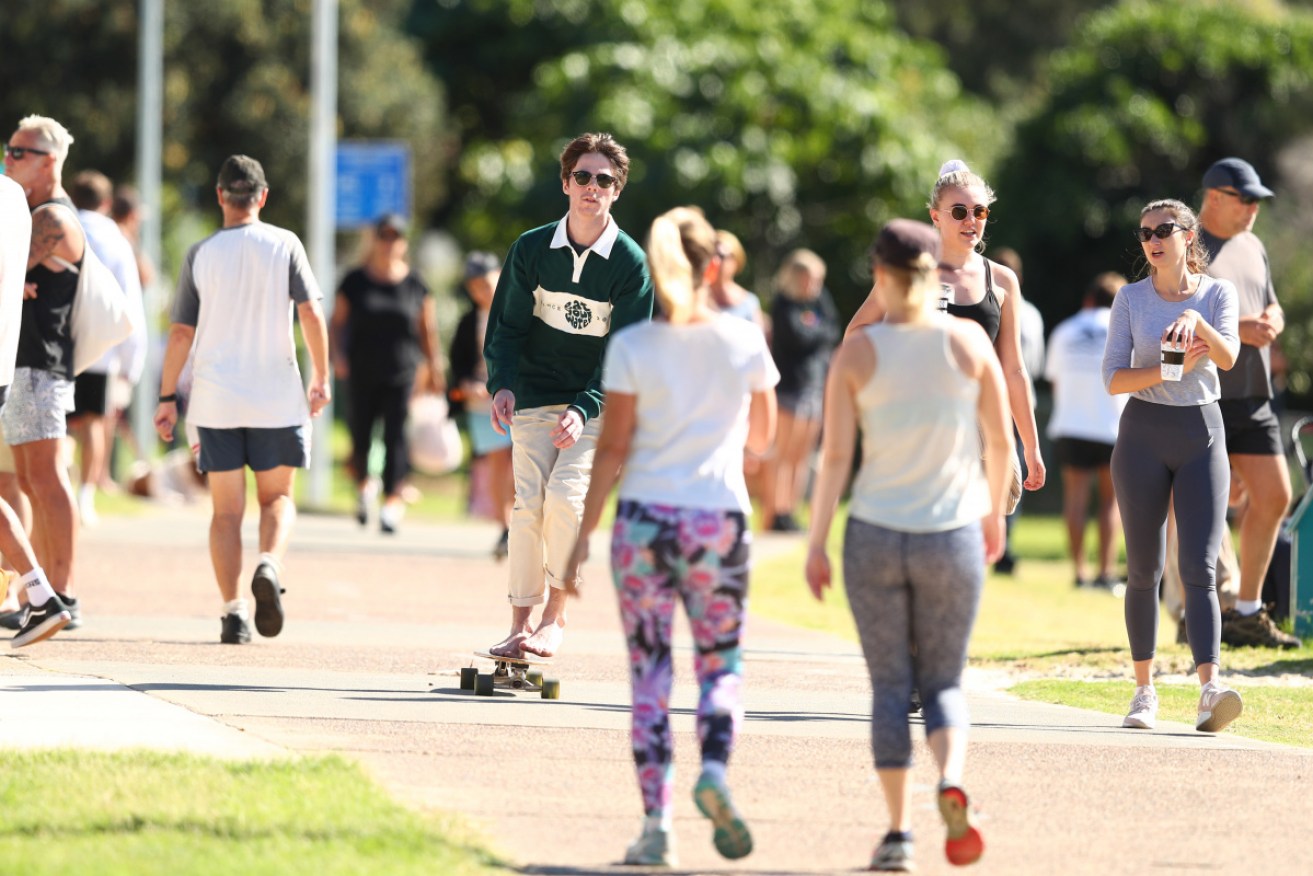As coronavirus lockdown continues, here is the best walking etiquette

People walk along Burleigh Heads foreshore on the Gold Coast on Saturday. Photo: Getty
With COVID-19 restricting many activities, many of us are walking more than usual, even the over-70s, a category which I have reached.
I enjoy walking. Previously, my normal practice had been to step off the footpath for certain groups of people coming towards me: parents wheeling prams or strollers; people using walking frames or in wheelchairs; others with disabilities as well as people who look a fair bit older than me.
My practice had also been not to get off the footpath for people with dogs, adults on bicycles and people looking at their phones, oblivious to the world around them.
Most reactions to my eccentricity had still been friendly with smiles exchanged.
But things have changed. With social distancing, I’ve noticed that people I meet coming towards me on the footpath fall into five broad categories.
First, the older people: they are very careful, stepping onto the grass verge or sliding along next to a front fence.
They know they are in a high-risk group, as I am too. If we both step onto the verge at the same time, there is the danger of a collision.

Walking in lockdown shows there are five types of people, writes Kim Oates. Photo: Getty
Then there are people walking their dogs: Some seem to think their dog provides social distancing.
Many dog walkers I encounter stay firmly on the path with their dog, meaning this particular geriatric has to walk along the verge.
That’s OK for me, but many in my age group are less stable on rough surfaces.
Next come the joggers: This varies. Joggers roughly aged over 40 tend to be considerate and veer onto the grass or the road.
Younger joggers often expect you to nimbly get out of their way, particularly if they are connected to a mobile.
Of course, then there are the people on their phones: staying firmly in the centre of the path, totally engrossed and oblivious to the world. Here, nothing has changed.
Finally, the families with children on bicycles: One of the joys of walking during this time is seeing fathers having fun with their children. I suspect these fathers, now working from home, have not had much time to bicycle or play with their children until now.
It’s heart-warming to see them discovering the joy of being with their children. It’s also heart-warming to see some parents advise their children to move off the path when someone is approaching.
When quite young children ride their bicycles along the path, it’s wise to get off, particularly if it’s an approaching young rider whose cycle is wobbling.

People exercise on a coastal walk between Bondi and Coogee. Photo: Getty
In many of the people I meet, there is a look of anxiety, of fear. I smile and try to make eye contact, but many immediately look away.
Are they afraid COVID-19 can be transmitted by a smile or by eye contact, or is this just a symptom of a pervasive, damaging anxiety?
I recently heard a psychiatrist discussing “useful anxiety” and “damaging anxiety”.
Useful anxiety is knowing there is a dangerous virus around and taking sensible precautions such as handwashing and social distancing.
Damaging anxiety is a pervasive anxiety where people ruminate and dwell on things that may or may not happen and which they can do little about: Will there be a vaccine in time? Will it work? Will the economy ever recover? What will the world be like in 10 years? There is nothing wrong with concerns like these unless they morph into a pervasive, crippling anxiety.
What can we walkers do to help reduce damaging anxiety? Some of my friends are making a point of trying to make eye contact and smiling at everyone they meet.
After all, you can’t catch COVID-19 from a smile.
A front-line nursing colleague, who often has to wear a mask, mentioned the anxiety she sees in her patients.
She tries to counteract it by smiling behind the mask, thinking “I hope that the quiet smile they see in my eyes will drown out the screams of fear they hear in their mind.”
So fellow walkers, coffee aficionados and shoppers, let’s try more smiles. If enough join in, this small act of kindness may catch on. It may even go viral.
Kim Oates is an Emeritus Professor in the Discipline of Child and Adolescent Health at Sydney University and the author of several books for parents.








